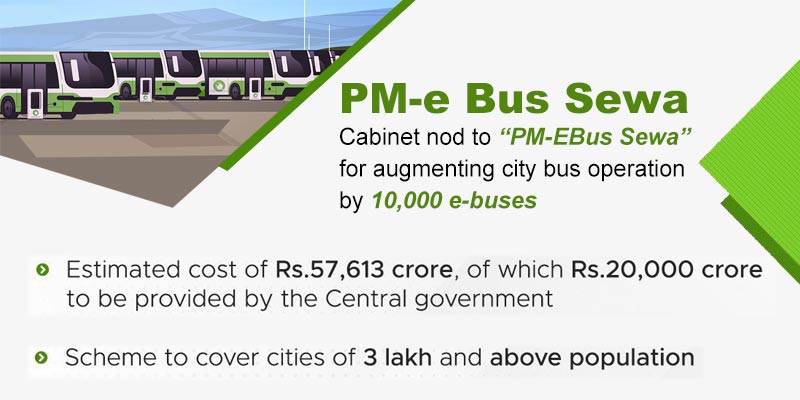- India
- Aug 17
What is ‘PM-eBus Sewa’ scheme?
• The Union Cabinet approved the ‘PM-eBus Sewa’ scheme under which 10,000 electric buses will be provided to 169 cities under the public-private partnership (PPP) model.
• The scheme would have an estimated cost of Rs 57,613 crore out of which Rs 20,000 crore will be provided by the central government and the remaining will be borne by states.
• While presenting the Union Budget 2021-22, Finance Minister Nirmala Sitharaman had announced a Rs 18,000 crore scheme to augment public transport in urban areas.
The scheme will generate 45,000 to 55,000 direct jobs
• The scheme has two segments — augmenting city bus services in 169 cities and green urban mobility initiatives in 181 cities.
• Under the second segment, the scheme envisages green initiatives like bus priority, infrastructure, multi-modal interchange facilities, National Common Mobility Card (NCMC) based automated fare collection systems and charging infrastructure.
• The scheme will generate 45,000 to 55,000 direct jobs through deployment of around 10,000 buses in city bus operation.
• The scheme will cover cities of three lakh and above population as per Census 2011, including all the capital cities.
• Priority will be given to those cities which do not have an organised bus service. The scheme would continue till 2037.
• As many as 10,000 e-buses will be deployed under the PPP model.
• More buses would be provided to those cites which will scrap old buses. The buses would be procured, operated and maintained under the PPP model and central assistance would be provided under the scheme.
• Under the scheme, cities will be responsible for running bus services and making payments to bus operators.
• The central government will support these bus operations by providing subsidies to the extent specified in the proposed scheme. Priority will be given to those cities that have no organised bus service.
Key features of the scheme:
• The scheme will promote e-mobility and provide full support for behind-the-meter power infrastructure.
• Cities will also be supported for development of charging infrastructure under green urban mobility initiatives.
• The support to bus priority infrastructure shall not only accelerate the proliferation of state-of-the-art, energy efficient electric buses but also foster the innovation in the e-mobility sector as well as development of a resilient supply chain for electric vehicles.
• This scheme shall also bring in economies of scale for procurement of electric buses through aggregation for e-buses.
• Adoption to electric mobility will reduce noise and air pollution and curb carbon emission.
• Modal shift due to increased share of bus-based public transportation will lead to reduction of greenhouse gases.
Manorama Yearbook app is now available on Google Play Store and iOS App Store


